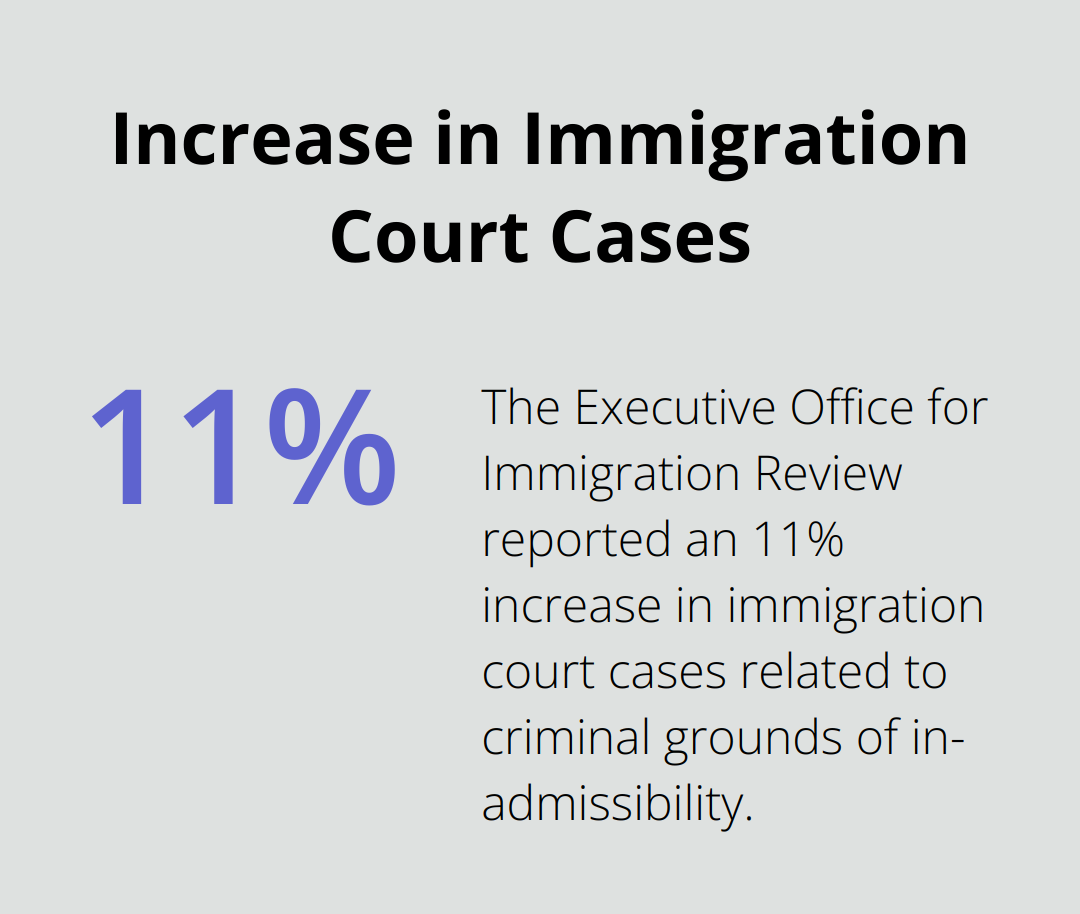
How to Handle Petty Offense Exception for AOS?
Navigating the complexities of immigration law can be challenging, especially when it comes to the petty offense exception for Adjustment of Status (AOS). At Law Offices of Jeffrey A. Thompson, we often encounter clients who are unsure about how this exception applies to their case.
Understanding the petty offense exception is crucial for individuals seeking to adjust their status despite having a minor criminal record. This blog post will guide you through the intricacies of applying for AOS with a petty offense, helping you avoid common pitfalls and maximize your chances of success.
What Is the Petty Offense Exception?
The petty offense exception plays a key role in U.S. immigration law, particularly for individuals who seek Adjustment of Status (AOS). This provision offers a lifeline to certain applicants with minor criminal offenses, allowing them to overcome inadmissibility barriers and continue their immigration journey.
Defining a Petty Offense
In immigration law, a petty offense refers to a crime that, while still considered a Crime Involving Moral Turpitude (CIMT), receives less severe treatment due to its nature and the punishment imposed. The U.S. Citizenship and Immigration Services (USCIS) assesses these offenses based on specific criteria, rather than relying solely on criminal court classifications.
Qualifying Criteria
To fall under the petty offense exception, an applicant must meet strict requirements:
- The individual must have committed only one CIMT. Multiple offenses, even if minor, disqualify an applicant from using this exception.
- The maximum possible sentence for the crime must not exceed one year of imprisonment.
- The actual sentence imposed must be six months or less (regardless of time served).
These criteria are absolute. Cases exist where clients missed qualifying for the exception by mere days in their sentence, which underscores the importance of precise legal understanding and representation.
Impact on Adjustment of Status
The petty offense exception can transform the prospects for AOS applicants. Without it, even a single CIMT could render an individual inadmissible, potentially derailing their path to lawful permanent residency. A successful application of this exception allows applicants to overcome this hurdle and proceed with their AOS application.
However, applicants should note that the exception doesn’t erase the offense from their record. It simply allows USCIS to overlook it for the purposes of determining admissibility. Future immigration benefits or travel may still feel the impact, which is why thorough documentation and expert legal guidance prove essential.
Recent USCIS data indicates that USCIS completed about 7 percent more adjustment of status applications in FY 2022 (611,000) than in FY 2021 (572,100).

As we move forward, we’ll explore how to apply the petty offense exception in AOS cases, including the necessary documentation and common pitfalls to avoid.
Applying the Petty Offense Exception in AOS Cases
Essential Documentation
The success of a petty offense exception claim depends on comprehensive documentation. Applicants must obtain certified court records that detail their conviction. These records should include the statute of conviction, the imposed sentence, and any time served. Such documents provide critical evidence to demonstrate eligibility for the exception.
Applicants should also collect character references, proof of rehabilitation, and evidence of positive community contributions. While not directly related to the offense, these materials can bolster the overall application and showcase good moral character.
Effective Case Presentation
When submitting an AOS application, applicants must clearly articulate how their situation meets the petty offense exception criteria. This involves the creation of a detailed legal memorandum that outlines relevant law and applies it to the specific circumstances.
The memorandum should address each element of the petty offense exception, providing clear evidence that:

Common Pitfalls to Avoid
Many applicants face difficulties when claiming the petty offense exception due to preventable errors. A frequent mistake involves misinterpretation of the “maximum possible sentence” criterion. This refers to the maximum sentence allowable by law for the offense, not the actual received sentence.
Another common error involves failure to disclose all criminal history, even if unrelated to the petty offense in question. USCIS conducts thorough background checks, and any omissions can lead to serious consequences (including application denial and potential removal proceedings).
Some applicants incorrectly assume that expunged or sealed records need not be disclosed. However, for immigration purposes, these records must still be reported and explained.
Legal Assistance
The complexity of the petty offense exception process often necessitates professional legal guidance. Experienced immigration attorneys can help applicants navigate potential pitfalls and significantly improve their chances of success. They can ensure that all necessary documentation is properly obtained and presented, and that the legal arguments are compelling and well-structured.
The next chapter will explore the challenges and considerations that applicants should keep in mind when applying for the petty offense exception in their AOS cases.
Navigating Petty Offense Exception Challenges
The petty offense exception, while beneficial for many AOS applicants, presents its own set of challenges and limitations. This section explores the complexities that applicants must consider when pursuing this route.
Scope Limitations
The petty offense exception applies only to a single Crime Involving Moral Turpitude (CIMT). Applicants with multiple CIMTs on their record, regardless of how minor, cannot use this exception. This strict limitation often surprises many applicants, especially those with a history of minor infractions.
Certain types of offenses fall outside the petty offense exception. Drug-related crimes, for instance, do not qualify for this waiver. The American Immigration Lawyers Association reports that drug offenses remain one of the most common reasons for AOS denials (even for seemingly minor infractions like possession of small amounts of marijuana).
Future Immigration Implications
The petty offense exception helps overcome immediate inadmissibility issues, but applicants must understand its long-term implications. The offense remains on an individual’s record and may impact future immigration benefits or international travel.
For example, USCIS reviews an applicant’s entire criminal history during citizenship applications, including offenses covered by the petty offense exception. Naturalization may be revoked by conviction for procuring or attempting to procure the naturalization of anyone contrary to the law.
Complexity of Legal Interpretation
The qualification of an offense for the petty offense exception often involves complex interpretation. Different states classify crimes differently, and federal immigration law may interpret these classifications in unexpected ways. An offense considered minor in one jurisdiction could receive more serious treatment under immigration law.
A Migration Policy Institute study found that inconsistencies between state criminal laws and federal immigration laws lead to significant variations in outcomes for similar offenses across different states. This highlights the need for expert legal advice to navigate these nuances.
Changing Immigration Policies
Immigration policies and their interpretations can shift with new administrations or court decisions. What qualifies for the petty offense exception today might not qualify tomorrow. Staying informed about these changes proves essential but challenging for individual applicants.
The Executive Office for Immigration Review reported an 11% increase in immigration court cases related to criminal grounds of inadmissibility in the last fiscal year. This indicates a trend towards stricter interpretations of criminal history in immigration contexts.

Seeking Professional Guidance
Given these challenges, professional legal counsel often provides the best course of action, especially for complex cases involving criminal history. An experienced immigration attorney can offer up-to-date guidance, interpret the nuances of specific cases, and develop strategies to overcome potential obstacles in AOS applications.
Final Thoughts
The petty offense exception for Adjustment of Status (AOS) provides an opportunity for individuals with minor criminal records to overcome inadmissibility barriers. This complex area of immigration law requires careful attention to detail and a thorough understanding of the legal landscape. Accurate documentation and clear presentation of how an applicant’s situation meets the exception criteria are essential components of a strong application.
The complexities surrounding the petty offense exception adjustment of status process highlight the value of professional legal assistance. At Law Offices of Jeffrey A. Thompson, we specialize in guiding clients through intricate immigration matters, including AOS applications involving petty offenses. Our experienced team provides expert advice, ensures comprehensive documentation, and develops compelling legal arguments to support your case.
The petty offense exception can be a powerful tool in overcoming inadmissibility, but it has limitations. Future immigration benefits may still feel the impact, and changing policies can affect eligibility. You can navigate these challenges more effectively and increase your chances of a successful AOS application with professional legal counsel (such as our experienced team).


